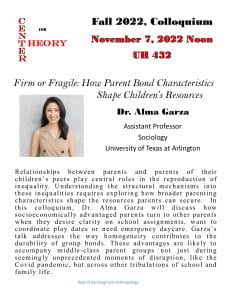 November 7, Monday – Dr. Alma Garza, Assistant Professor of Sociology (UTA)
November 7, Monday – Dr. Alma Garza, Assistant Professor of Sociology (UTA)
Noon – 432 University Hall
Join us for the first Center for Theory Colloquium of the 2022-23 school year.
Firm or Fragile: How Parent Bond Characteristics Shape Children’s Resources
 Abstract: Relationships between children’s parents and their peers’ parents play central roles in the reproduction of inequality. Although scholars link greater forms of parent bonding to positive academic outcomes, middle-class parent groups tend to claim more substantial school rewards. Understanding the structural mechanisms implicated in these inequalities, however, necessitates insights not of how middle-class parents secure unequal advantages for their children but of how broader parent bond characteristics shape the resources parents are able to secure. We draw on semi-structured interviews conducted during the first complete academic year of remote schooling to understand how parent bond characteristics shape the type of aid parents provide to their children. Whereas socioeconomically disadvantaged parents reported greater isolation from other parents and drew on these relationships in focused ways, the greater social class homogeneity among socioeconomically advantaged parent groups enabled advantaged parent groups to assume a more omnivorous function. Advantaged parents turned to other parents when they desired clarity on school assignments, wanted to coordinate play dates and/or needed emergency daycare. We argue that homogeneity contributes to the durability of group bonds because similar others help fulfill a diverse rather than focused set of needs. These advantages are likely to accompany middle-class parent groups not just during seemingly unprecedented moments of disruption, like the Covid pandemic, but across other tribulations of school and family life.
Abstract: Relationships between children’s parents and their peers’ parents play central roles in the reproduction of inequality. Although scholars link greater forms of parent bonding to positive academic outcomes, middle-class parent groups tend to claim more substantial school rewards. Understanding the structural mechanisms implicated in these inequalities, however, necessitates insights not of how middle-class parents secure unequal advantages for their children but of how broader parent bond characteristics shape the resources parents are able to secure. We draw on semi-structured interviews conducted during the first complete academic year of remote schooling to understand how parent bond characteristics shape the type of aid parents provide to their children. Whereas socioeconomically disadvantaged parents reported greater isolation from other parents and drew on these relationships in focused ways, the greater social class homogeneity among socioeconomically advantaged parent groups enabled advantaged parent groups to assume a more omnivorous function. Advantaged parents turned to other parents when they desired clarity on school assignments, wanted to coordinate play dates and/or needed emergency daycare. We argue that homogeneity contributes to the durability of group bonds because similar others help fulfill a diverse rather than focused set of needs. These advantages are likely to accompany middle-class parent groups not just during seemingly unprecedented moments of disruption, like the Covid pandemic, but across other tribulations of school and family life.
 Bio:
Bio:
Alma Nidia Garza examines issues at the intersection of race and ethnicity, social class and culture to understand how school and family junctures influence student academic opportunities and behaviors. She investigates how university organizational characteristics shape the upwardly mobile trajectories of first-generation, Hispanic college students. In a separate, yet relate research stream, Garza assesses how differentially advantaged parents leverage available resources to enhance their children’s academic and socioemotional well-being. Both projects aim to further understandings of how disparate and atypical academic contexts contribute to social class and racial-ethnic group inequalities in education.